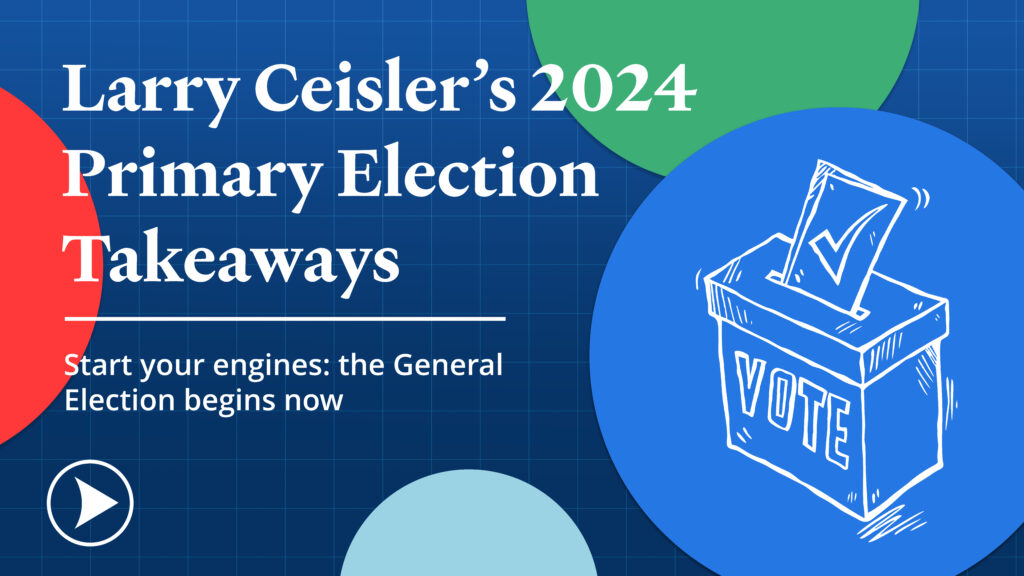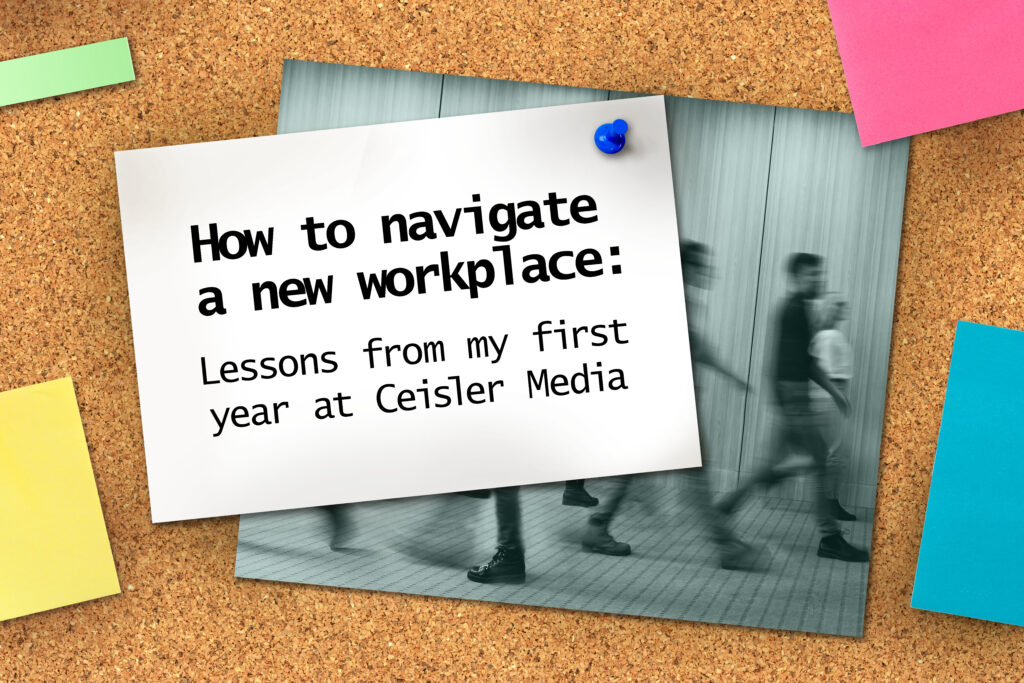A conversation between Larry Ceisler and Salewa Ogunmefun, Executive Director of Pennsylvania Voice.

Larry Ceisler: I feel that voting rights is the most important issue that’s facing us. This is not a Democrat vs. Republican issue — this is about democracy itself. As much as we were tested in the 2020 election, I think we’re going to be even tested more in 2022. For the people who want to undercut democracy and election integrity, 2020 was just a warmup for them.
I’ve just never understood what is wrong with encouraging people to participate in the electoral process, making it easier. I remember when I was a little kid, and I was interested in politics, I never understood why people voted on a Tuesday, during the week, between certain hours. Our firm is dedicated to it — we’re all in for making it easier for people to participate in the process.
Salewa Ogunmefun: I’m from Nigeria, originally, and I grew up in Maryland, where they use schools for polling places, and so on Election Day, we didn’t have school. I grew up believing that on Election Day, there was no school, and when I moved to Pennsylvania, I was just so confused. Pennsylvania is where I knocked on my first door, and I had my first conversation with a voter in the 2010 race. I spent the better part of three years traveling around the country working on campaigns in different states. And when I came back to Pennsylvania in 2016, I was confused again, because some of the work I had done was based in Jersey where we had incredibly robust vote-by-mail programs.
In 2016, when I came back, we had excuse vote-by-mail programs in Pennsylvania only, and literally one state away, they had no-excuse vote by mail. I’ve also been an operative in Florida, and we’re consistently hearing about the things that Florida is doing wrong. But one of the things Florida does really well is the way they structured their elections. When I worked in Florida there were two weeks of early voting at the centers throughout each county.
When I came back again to Pennsylvania, I was like, “Hey, how come we don’t have any early voting at all?” Or just something as basic as vote by mail, which before 2020 we didn’t have. We are dealing with archaic election law right now in Pennsylvania. There are states where it is so much easier to register to vote, and it’s so much easier to actually cast your ballot — in person for two weeks before Election Day, including weekends. That’s just common sense, right?
In Pennsylvania, the conversation isn’t about how do we make voting easier, which is what we know everyone in Pennsylvania believes in. We’ve talked to residents across the state, and they want it to be easier and more convenient. They believe everyone should be able to vote in the language they feel the most comfortable in. But instead of having those conversations, the narrative is being shaped by folks inside of the State House or the State Senate who are actively making it more difficult to vote, whether through taking away Act 77, or voter ID, which does nothing but make it more difficult to vote. If every single person has to pull out their ID every time they vote, the lines get longer.
It is more difficult to vote when we institute these policies. And there’s not a lot of people that voter ID would actually help. There’s no rampant voter fraud — it’s just a solution in search of a problem.
LC: The inability of the counties to prepare mail-in ballots to be scanned in advance, known as pre-canvassing, is a huge issue, and everybody knew it was going to be a problem, but obviously, there were people out there who wanted it to be a problem. And it was just very unfair, because everybody knew that not all of the votes were going to come in on Election Night. It is such a simple remedy, cutting down the time it takes to count the ballots, and it is just unconscionable to me that we can’t agree on something so simple. We’re going to have to find a way to remedy that. We just can’t have this dragging on for so long. I mean, my God, when I was younger we had paper ballots, and we knew the results that night. It just doesn’t make sense.
SO: I agree wholeheartedly. One simple thing that can actually be addressed, if the state legislature would act, is that our county administrations are severely underfunded. They don’t have enough poll workers to run elections. The resources that are provided to counties by the state are really limited. We are the fifth largest state in terms of total population, but our Department of State, which is tasked with running elections, is actually like fourth from the bottom in funding.
There are some county election administrators who aren’t interested in vote by mail or aren’t interested in these more modern election policies because they know it’s not going to come with additional resources for them to actually make sure that everyone can cast their ballot. And it’s not helpful to rob Peter to pay Paul.
So how do we fix this? I think a big part of it is making sure that we have fully funded elections. But this year in the budget process, we saw restrictions on funding that actually helped us run our elections in 2020. That private funding that bailed counties out in 2020? The legislature decided that’s not allowed anymore. In exchange, we got $45 million for the counties, not the Department of State. The counties have to apply for this funding, but it comes with more restrictions on what they can do when counting ballots. So at least that’s something, but what happens in 2023 and 2024 and 2025?
The decisions we’re making about administering our elections are incredibly shortsighted. I am a huge proponent of making sure we have more modern elections, but that requires our state legislature to allocate resources for those elections to be modern, and for us to be able to make sure everyone can vote.

LC: You make a really good point there. These county election boards are under-resourced to begin with, and when they went through the trauma of 2020, people just quit. When you talk about the underfunding of the Secretary of State’s office for elections, probably one of the reasons is because it’s not an independently elected position, like in some states, so there’s really nobody there to fight for funding. The governor puts together his budget, and they’re just a cabinet position.
So we say, well, do I want more money in education or in elections? We have to be able to pay poll workers more money so that they come in, not only because they want to do something that’s good for their community, but also so they can afford to take off work. Hopefully the next governor understands the changes that need to be made. The Secretary of State’s office cannot be an afterthought, and it’s important to be thoughtful about who you put in there.
SO: I agree with that. The identification of the person we are putting in these positions is really important. Often, that decision is coming out of a political favor, or trying to check a box. They have so much power, and that power is so foundational to all the other decisions that get made by the government.
LC: I know you were heavily involved in legislative reapportionment, the process by which new state legislative maps are drawn every 10 years based on Census data. How do you think things will play out this year with the new maps?
SO: I have a great amount of respect and appreciation for the process that we went through last year in the redistricting cycle because it was much more thorough than ever before, and it gave the opportunity for much more citizen involvement than we have ever seen in Pennsylvania history.
Of course we can always do better with public engagement. We can do things earlier, we can involve more community members directly, but we really had a process last year that allowed for engagement of people who, in years past, were not as engaged on redistricting. That allowed us to end up with the most racially equitable maps in Pennsylvania history.
Look at that new district that was created in Luzerne County: we are looking at the growing demographics in Pennsylvania and appreciating where people are moving, and those people tend to be Black, Indigenous and people of color. We’re seeing the largest migration to parts of Pennsylvania that have been seen as much more white and rural, but they have cities that have large populations that are now growing in diversity. Creation of those districts will allow a community to actually elect the candidate of their choice.
In some of those districts, over the next five to six years, we’ll see the BIPOC population in some of those districts increase even more, and we’ll actually have candidates that win in the general elections that are from those communities and represent the diversity of the communities they’re from. In this most recent primary, we saw a Latinx candidate actually win in Luzerne County, and with the districts that existed two years ago, I don’t think that would have been a possibility. I’m really appreciative of opportunities like that.
As we are continuing to track population growth, we know for certain that the Census under-counted the same communities. We’re doing a lot to track the population growth trends over the next 10 years to make sure we set a standard in this cycle that continues 10 years from now so we have even more racially equitable maps.
LC: I thought the redistricting process was the best and most equitable process that I’ve witnessed. Advocacy like yours really played a role in making it more fair. Redistricting is messy, and it’s never going to be perfect. But this one was about as good as you’re gonna get.
The process is over for now, but as we saw in 2018 when the Pennsylvania Supreme Court redrew the federal legislative maps because they were unconstitutionally gerrymandered, there is always potential for a court case to provide unexpected changes. Is there anything you’re keeping an eye on?
SO: At a national level is the Alabama case, Merrill v. Milligan, that is currently before the U.S. Supreme Court, to be decided in the favor of adding an additional congressional district to represent communities of interest in the state of Alabama. I think that what happens in the Alabama case will likely decide what happens to Rep. [Kerry] Benninghoff’s attempt to overturn our maps. If the decision is made that we don’t need that extra congressional district in Alabama, then I am concerned about the future of redistricting in the state of Pennsylvania.
I’m excited to keep pushing to make sure we can do better in every cycle, every election, every redistricting cycle. We have so many victories this year, despite there being people making decisions to make it harder to vote in Pennsylvania. I’m honored and excited to be a part of making it easier and more convenient.
And I’ve appreciated working with Ceisler Media on shaping the narrative in order to make sure we can change the way we’re talking about voting in Pennsylvania and really create an ecosystem where we’re having conversations about making it easier versus having conversations about making it more difficult.

Larry Ceisler is founder of Ceisler Media and Issue Advocacy.
Salewa Ogunmefun is executive director of Pennsylvania Voice.




